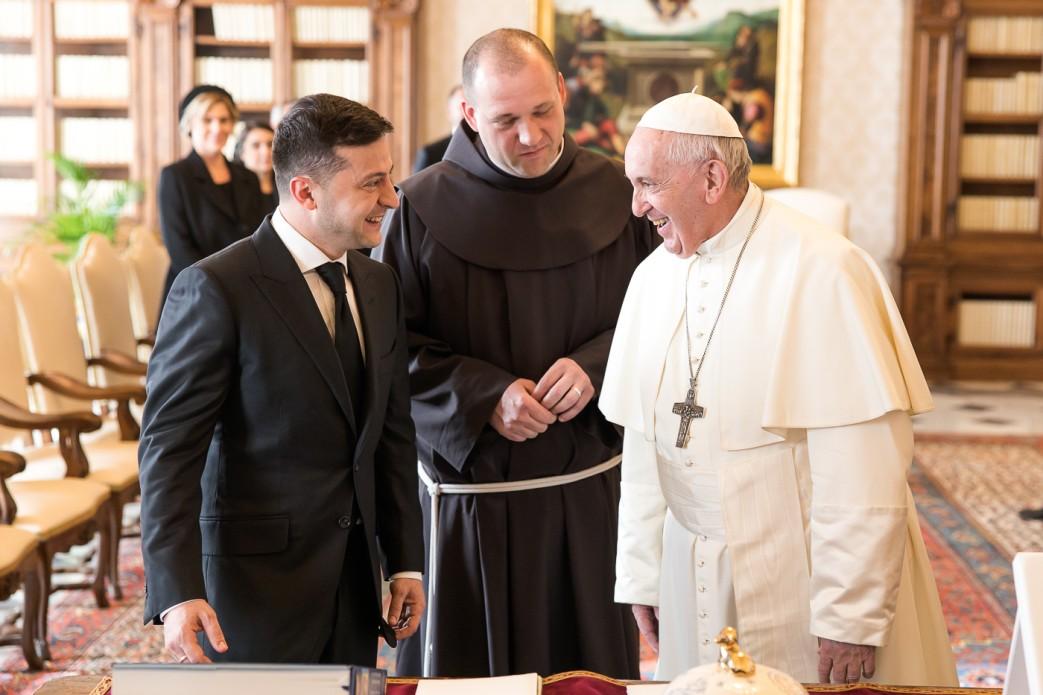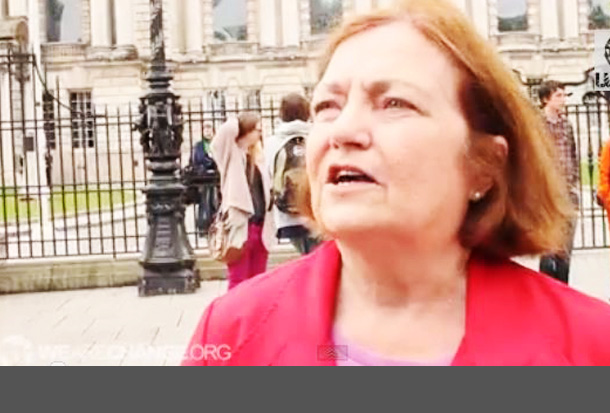
The Pope’s Comments
May Help Avert a Global Conflict
Patrick Murphy / The Irish News
(June 18, 2022) — Could the Pope be right about the war in Ukraine? He is regarded as infallible in matters of doctrine, but how is he on international politics?
The question arises because Pope Francis said this week that the war was “perhaps somehow either provoked or not prevented.”
In what appears to be a direct criticism of devout Catholic US President, Joe Biden, the Pontiff claimed that an un-named head of state warned him before the Russian invasion that NATO was “barking at the gates of Russia.”
While strongly condemning Russia’s subsequent actions, Francis pointed out that the war was not like the Little Red Riding Hood fairy tale of simplistic good and bad: “Something global is emerging and the elements are very much entwined.”
This in no way suggests that Russia’s inhumanity in Ukraine can be condoned, but if we are to seek a solution to this awful war, we might first try to understand its origins.
Following the collapse of European communism, the US-led West had two choices: bring Russia in from the cold, or aim for total global power by confronting it. Urged on by Margaret Thatcher, George H Bush went for the second option, recruiting Russia’s former satellite states into NATO, the West’s military alliance.
However, addressing the German parliament in 2001, Putin proposed “large-scale and equal pan-European co-operation,” effectively pleading for Russia to join Europe “on the path to freedom and democracy.” Following 9/11, he proposed that Russia should join NATO and the EU, trying to ally himself with the West.
All his proposals were refused. By 2004, ten states close to Russia had joined NATO, bringing western armies to the Russian border. Putin was rebuked and effectively humiliated by the West at several international conferences, including Munich (2007) and Bucharest (2008).
Isolated, he found a willing ally in China.
So the Pope’s assertion that the war was avoidable is worth considering, although none of this still justifies Russia’s actions in Ukraine.
When the Ukrainian president refused to sign a free-trade agreement with the EU in 2014, street protests led to his overthrow, in what many political analysts have described as a US-backed coup. President Obama said that the US could “never have a constructive relationship with Russia” and he intended to cut off its economic and political ties to the outside world.
Vice-President Biden visited Kiev to encourage a crackdown on those opposing the new pro-western regime. Putin copied the US street-protest tactic in Crimea (then part of Ukraine), which subsequently voted overwhelmingly to join Russia. His aim was to keep NATO away from the Russian border.
Meanwhile Russia’s economic influence was expanding in Europe. By 2001, for example, German trade with Russia and China surpassed that with the US. America’s influence in Europe was declining. Defence Secretary Lloyd Austin has said the US wanted to “see Russia weakened.”
The plan was that Ukraine should join NATO. Putin moved his troops to the Ukraine border in a predictable response.
Whatever he did next, he would lose. Invading Ukraine would be universally condemned. Backing down would lose face. He invaded and although the rest is brutal and unrelenting history, the evidence suggests that the Pope’s claim of provocation merits consideration.
He has previously remarked that despite the horrors of other wars, the Ukraine conflict is different by threatening the whole world, pricking “the conscience of every Christian and every Church.”
Ireland responded to the war in two ways. It generated pro-US arguments for joining NATO (as in many other European states) and, more commendably, it accepted 30,000 Ukrainian refugees. (The US has taken in 704. In March, it took in 12, apparently believing that it has no responsibility for the consequences of supporting a war.)
The Pope has started a debate [that] might help not just to resolve a war, but avert a global conflict. Church and political leaders in Ireland might now like to contribute to that debate.

NATO Expansion Has Been the
Main Cause of Ukraine’s Military Conflict
Mairead Mcguire/ The Irish News
BELFAST (July 4, 2022) — Patrick Murphy’s column [is] courageous and challenging. Courageous in that Ireland (and most of Europe) are caught up in Russia-phobia and war propaganda being peddled by our mainstream media and military industrial complex. Mr. Murphy quoted Pope Francis as saying that the war was “perhaps somehow either provoked or not prevented.”
I think this statement hints towards the elephant in the room (NATO/US endless expansion).
The US Peace Council of May 12 describes the Ukraine as a US-manufactured conflict and says: “Russia’s military intervention in Ukraine could have been avoided if the US had not relentlessly provoked it.”
NATO — the US-dominated global war machine — whose policy is ‘full dominance spectrum’ contrary to its claims it is not a defensive organisation. Its purpose has been to act as an instrument for US world domination and to prevent all challenges to US hegemony.
It should have been disbanded in l99l after the dissolution of the Warsaw Pact, but instead it expanded to 15 new countries, breaking its promise to President Gorbachev, that it would not expand east.
This relentless eastward expansion of NATO during the past decade has been an existential threat to a nuclear-armed Russia and the main cause of the present military conflict in Ukraine. Russia’s military intervention into Ukraine should never have happened and the suffering inflicted upon the Ukrainian people (and Russian) has been horrific and it is right [that] all those who have suffered so much should be helped. However, sending arms into Ukraine only adds fuel to the fire.
There are vested interests from western powers hard at work, and much money to be made. As it stands, the west is bankrolling the war with arms and billions in dollars/euros, for their own agenda.
These people will not shed a tear for the young dead of Ukraine. Their aim is for a weakened Russia (through sanctions), more military spending, and a more divided and economically weak Europe and, as long as we continue not to question their role in Ukraine, they will succeed. There seems to be only one winner in this, and they are not in Europe.
Now is the time for dialogue and those western political leaders who stoke the fire of fear, division and hate in Ukraine, instead of calling for a ceasefire and negotiation, must consider the misery brought upon the poor people that most live with the horrors of war.
Ireland needs to protect its neutrality and play a positive role of peace and reconciliation on the Security Council. Opening Ireland increasingly to hosting arms manufacturers leaves its people vulnerable to becoming involved in war instead of peace.
Mairead Maguire is a peace activist from Northern Ireland. She co-founded, with Betty Williams and Ciaran McKeown, Women for Peace, which later became the Community for Peace People. Maguire and Williams were awarded the 1976 Nobel Peace Prize
Posted in accordance with Title 17, Section 107, US Code, for noncommercial, educational purposes.